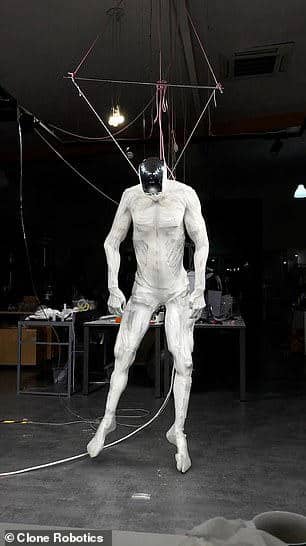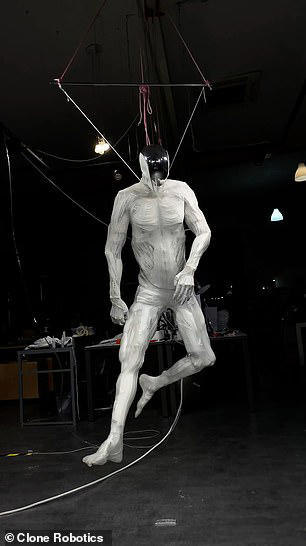Humanoid robots have come a long way but often still move with an unnatural, clunky stiffness—until now. A Polish startup, Clone Robotics, has unveiled Protoclone, a faceless humanoid robot with terrifyingly lifelike movement powered by synthetic muscles hidden beneath translucent skin.
A viral clip posted by Clone Robotics shows Protoclone, a 6-foot-tall synthetic human, flailing its limbs like a possessed marionette while hanging from the ceiling in a dimly lit development lab. The scene, set to ominous music, looks like something straight out of a cyberpunk horror film—or worse, a prequel to The Terminator.
A New Breed of Humanoid

Protoclone is being touted as “the world’s first bipedal, musculoskeletal android,” designed with artificial bones, tendons, and muscles that mimic human physiology. Unlike the stiff, mechanical movements of other humanoid robots, Protoclone boasts over 200 degrees of freedom—meaning it can perform movements eerily close to those of an actual human.
This version of the bot isn’t walking yet—unlike Tesla’s Optimus or Boston Dynamics’ Atlas—but its 1,000 artificial muscle fibers and 500 sensors suggest that once it does, it may outclass its competitors in natural movement. The prototype runs on a 500-watt electric pump circulating water through its artificial veins, which Clone Robotics says will soon replace a more powerful hydraulics system.
Terrifying or Revolutionary?

The internet had mixed reactions. While some marveled at the robot’s ultra-realistic muscle structure, others were utterly unnerved by its faceless design and frantic movements. One social media user jokingly suggested, “Just draw a smiley face on it, please!”—while another ominously warned, “Hanging it was a good choice. Now leave it there and never let it loose.”
Dr. Michelle Dickinson, a nanotechnologist, echoed the unease, saying,
“Seeing this faceless android in action has creeped me out. It’s made me realize how accustomed we’ve become to robots designed to look friendly.”
Despite the eerie reactions, Clone Robotics has grand ambitions for Protoclone. The company envisions a future where synthetic humans handle everyday tasks, from pouring drinks and cooking dinner to folding laundry and vacuuming floors.
The Future of Synthetic Humans
Clone Robotics, founded in Wrocław, Poland, in 2021, now has offices in California and is rapidly expanding. The company is hiring engineers and technicians to accelerate its vision. Its mission? To create “superintelligent androids with the most human-level hands in the world.”
While the cost of Protoclone remains a mystery, one thing is clear: this is only the beginning. Whether the future involves friendly robotic assistants or something straight out of a sci-fi horror movie, one thing is sure—Protoclone has brought us one step closer to a world where synthetic humans walk among us.


